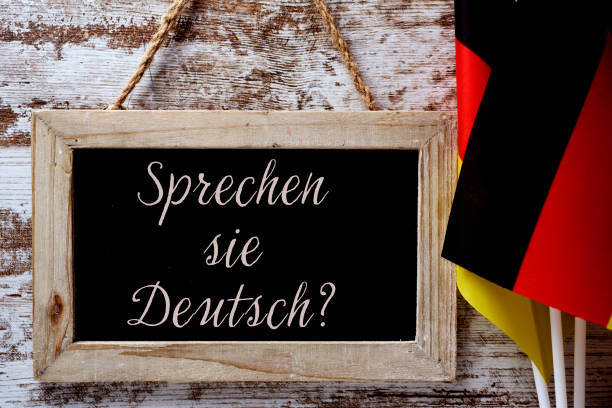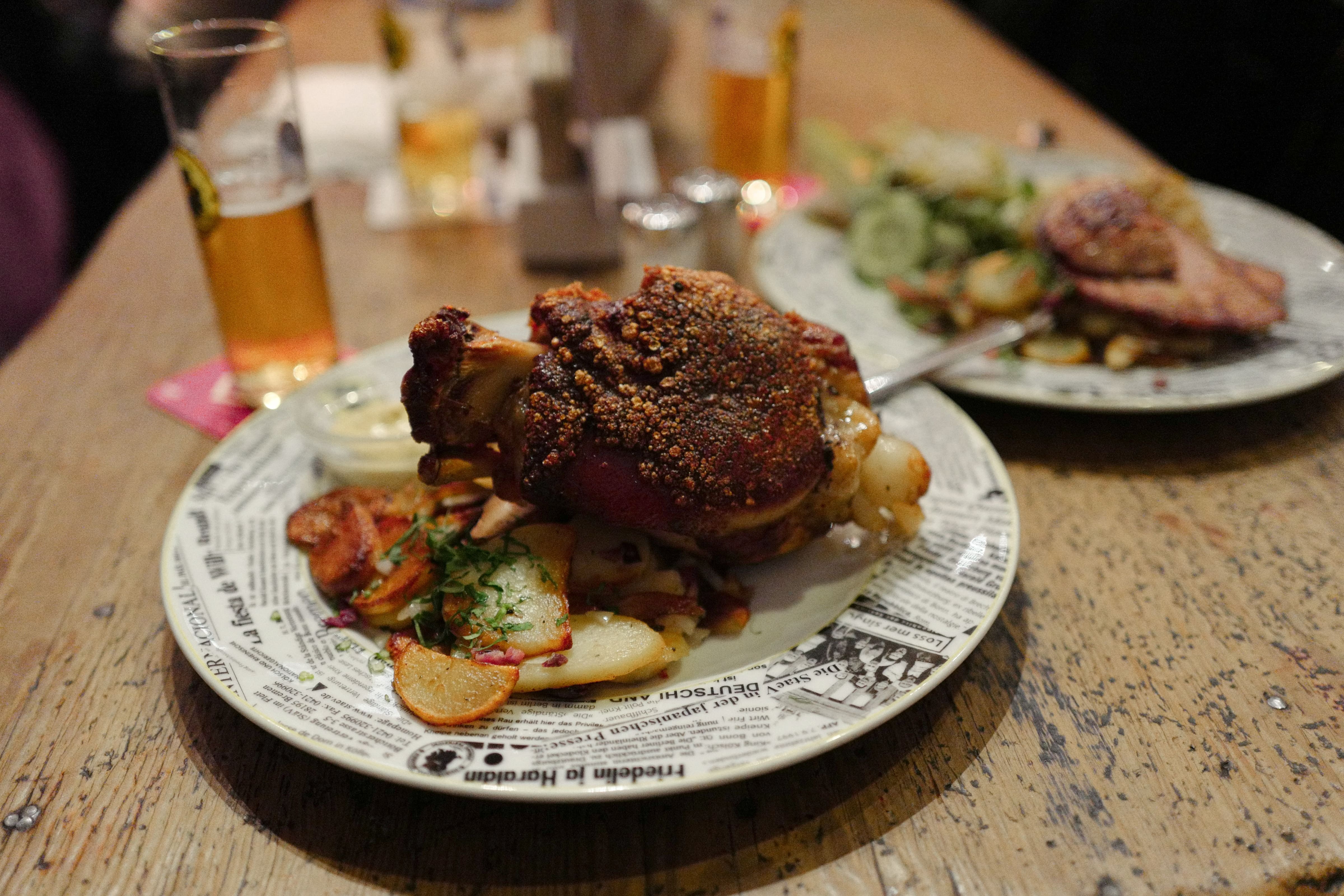
160 German Expressions That’ll Make You Sound Like a Native
There are certain words and phrases that every language uses on the daily.
If you can learn these cool German words and phrases, you’ll find everyday conversation much easier to navigate!
This post contains 160 useful German phrases that are sure to boost your conversational skills and help you out in any situation.
Contents
- Common German Slang
- Basic Greetings in German
- Asking for Help in German
- German Conversational Phrases
- Food and Drink in German
- German Travel Phrases
- German Shopping Phrases
- German Expressions in Cases of Emergency
- Why You Should Learn German Phrases
- How to Learn Common German Phrases
- And One More Thing...
Download: This blog post is available as a convenient and portable PDF that you can take anywhere. Click here to get a copy. (Download)
Common German Slang
These fun German slang phrases will definitely give you extra street cred and impress your German friends.
1. Moin, moin
Meaning: Morning/Hi/Hello/Good day/How are you?
This multi-purpose phrase is mostly used in Northern Germany.
2. Geil
Meaning: Awesome/Cool/Sexy
This slang term can be used for all things good, but tread carefully—it can refer to sexual arousal, too.
3. Dit jefällt ma
Meaning: I like it
This is Berlinian dialect for Das gefällt mir (I like it).
4. Na?
Meaning: Hey, what’s up?/How are you?/Well?
You can even answer this with Naaa? to say “I’m good, how about you?”
5. Basta
Meaning: Period
As in, “end of discussion.” This is useful when you’re not interested in hearing any backchat or excuses.
6. Quatsch
Meaning: Nonsense/That’s ridiculous
7. Ich habe die Nase voll
Meaning: I’m fed up/I’m sick of it
Literal: I have a full nose
8. Das ist nicht mein Bier
Meaning: Not my problem
Literal: That’s not my beer
You can also say das ist dein Bier (this is your beer) to point out that the thing in question is someone else’s burden to bear.
9. Abwarten und Tee trinken
Meaning: Just wait and see
Literal: Wait and drink tea
10. Ich verstehe nur Bahnhof
Meaning: I don’t understand any of that/It’s all Greek to me
Literal: I only understand train station
11. Es ist mir Wurst
Meaning: I don’t care
Literal: It’s sausage to me
12. Das Leben ist kein Ponyhof
Meaning: Life is no picnic
Literal: Life is not a pony farm
13. Da haben wir den Salat
Meaning: Everything is a mess/Now we’re in a pickle
Literal: Here we’ve got the salad
14. Leben wie Gott in Frankreich
Meaning: Live like a king
Literal: Live like God in France
This phrase is a reflection of the past. At a time in history, royalty lived fancy and rich in the kingdom of France while the German city-states lived in relative poverty, struggling to feed themselves.
15. Der Zug ist schon abgefahren
Meaning: That ship has sailed/The opportunity is gone
Literal: The train has already left
16. Innerer Schweinehund
Meaning: Devil on your shoulder
Literal: Inner pig-dog
The German people’s “inner pig-dog” is the voice in one’s head that steers you wrong.
17. Morgenstund hat Gold im Mund
Meaning: The early bird gets the worm
Literal: Morning hours have gold in the mouth
18. Hunde, die bellen, beißen nicht
Meaning: His bark is worse than his bite
Literal: Dogs that bark don’t bite
Basic Greetings in German
Now, let’s go over how to say hello to native German speakers and exchange some basic pleasantries.
19. Hallo
Meaning: Hello
20. Guten Morgen
Meaning: Good morning
This is a common greeting used until noon.
21. Guten Tag
Meaning: Good afternoon
Use this between noon and 6 pm.
22. Guten Abend
Meaning: Good evening
This greeting is used from 6 pm to bedtime.
23. Wie geht es Ihnen?
Meaning: How are you? (formal)
This form should be used with strangers and people who command respect, such as a boss, teacher or elder.
24. Wie geht’s dir?
Meaning: How are you? (informal)
You can use this version of the phrase in more casual interactions, like with friends and family.
25. Mir geht es gut, danke
Meaning: I am fine, thank you
26. Freut mich zu hören
Meaning: Glad to hear it
27. Mir geht es nicht so gut
Meaning: I’m not so good
28. Es tut mir leid
Meaning: I’m sorry
You might also hear the shortened version: tut mir leid.
29. Gesundheit
Meaning: Bless you (said after someone sneezes)
Literal: Health
30. Alles Gute zum Geburtstag!
Meaning: Happy birthday!
31. Machs gut
Meaning: Take care
32. Bis später
Meaning: See you later
If you know you’re seeing this person again within the next day, you can bid them farewell with this phrase.
33. Bis bald
Meaning: See you soon
If you think you’ll see this person again in the near future but you’re not exactly sure when, you can opt for this expression.
34. Auf Wiedersehen
Meaning: Goodbye
35. Tschüss
Meaning: Bye
36. Gute Nacht
Meaning: Good night
37. Einen schönen Tag noch
Meaning: Have a nice day
38. Schönes Wochenende
Meaning: Have a nice weekend
39. Ebenso / Gleichfalls
Meaning: Same to you
Asking for Help in German
As a stranger in a German-speaking country, you will likely need help from a local at some point or another; these phrases will make it a little easier.
40. Entschuldigung
Meaning: Excuse me/Sorry
You’ll also likely hear the contracted version when out and about: ‘Schuldigung.
41. Sprechen Sie Englisch?
Meaning: Do you speak English? (formal)
42. Ja
Meaning: Yes/Yeah
43. Nein
Meaning: No
44. Bitte
Meaning: Please
This word has several important functions in German.
45. Ich spreche nur ein bisschen Deutsch
Meaning: I only speak a little German
46. Ich brauche eine Auskunft
Meaning: I need some information
47. Ich brauche Hilfe
Meaning: I need help
48. Bin ich hier richtig?
Meaning: Am I in the right place?
49. Wie sagt man … auf Deutsch?
Meaning: How do you say … in German?
50. Danke schön
Meaning: Thank you
There are many ways to say thank you in German. Danke schön is like the English “thank you,” whereas danke on its own is like “thanks.”
51. Vielen Dank für Ihre Hilfe
Meaning: Thanks so much for your help (formal)
52. Gern geschehen
Meaning: You’re welcome
German has other ways to express “you’re welcome,” too.
German Conversational Phrases
These phrases will help you hold a conversation in German—you can even practice before you go! Note that some phrases differ in formality.
53. Wie ist Ihr Name? / Wie heißt du?
Meaning: What is your name? (formal/informal)
54. Ich heiße… / Mein Name ist…
Meaning: My name is…
55. Woher kommen Sie? / Woher kommst du?
Meaning: Where are you from? (formal/informal)
56. Ich komme aus…
Meaning: I’m from…
57. Ich wohne in…
Meaning: I live in…
58. Wie lange bleiben Sie in Deutschland / Österreich / der Schweiz?
Meaning: How long are you staying in Germany/Austria/Switzerland?
59. Ich bleibe eine Woche hier
Meaning: I am staying here for one week
Of course, you can replace eine Woche with something like zwei Wochen (two weeks), sechs Tage (six days), etc.
60. Wie alt sind Sie? / Wie alt bist du?
Meaning: How old are you? (formal/informal)
61. Ich bin 20 Jahre alt
Meaning: I am 20 years old
Brush up on your German numbers so you can replace 20 with your own age.
62. Was machen Sie / Was machst du beruflich?
Meaning: What do you do for work? (formal/informal)
63. Ich bin…
Meaning: I’m a/an…
You don’t need an article in German (words like “a” or “the”) before the job title here, so you’re literally just saying “I am teacher” or whatever your job is.
64. Ich bin verheiratet
Meaning: I’m married
65. Ich bin ledig
Meaning: I’m single
66. Meine Handynummer ist…
Meaning: My cell phone number is…
This is in case your German-speaking crush is single as well. Impress them with some other romantic phrases, too. Or it can be useful for new friends.
67. Ich studiere…
Meaning: I am studying…
Note that this sentence can only be used to state what your major or subject area is, and not what you’re looking at to prepare for the upcoming test.
A few examples of how to fill in the blank: Geschichte (history), Jura (law), Zahnmedizin (dentistry), Volkswirtschaftslehre (economics).
68. Wie viele Geschwister hast du?
Meaning: How many siblings do you have?
69. Ich habe zwei Geschwister
Meaning: I have two siblings
70. Mein Lieblingsfilm ist…
Meaning: My favorite…is…
Note how “favorite film” becomes a one-word noun.
Knowing this, you can talk about your favorite food (Lieblingsessen), favorite sport (Lieblingssport) or favorite author (Lieblingsautor).
71. Ich lerne Deutsch
Meaning: I’m learning German
72. Was machst du sonst so?
Meaning: What else do you do? (informal)
Learn some German words about hobbies so you can bust out this phrase and then understand the response.
73. Ich… gerne
Meaning: I like to…
74. Ich mag…
Meaning: I like…
75. Ich hasse…
Meaning: I hate…
76. Meine Hobbys sind…
Meaning: My hobbies are…
77. Ich stimme dir zu
Meaning: I agree with you
78. Können Sie / Kannst du langsamer sprechen?
Meaning: Can you speak slower? (formal/informal)
79. Können Sie / Kannst du das bitte wiederholen?
Meaning: Can you repeat that please? (formal/informal)
80. Verstehen Sie? / Verstehst du?
Meaning: Do you understand? (formal/informal)
81. Ich verstehe nicht
Meaning: I don’t understand
82. Hat mich gefreut Sie / dich kennenzulernen
Meaning: It was nice meeting you (formal/informal)
83. Das ist mir legal
Meaning: I don’t care (Literal: That’s the same to me)
84. Spinnst du?!
Meaning: Are you crazy?!
85. …oder?
Meaning: …right?
Food and Drink in German
Now that you’ve got a conversation going, you might end up with a meal invite! These German expressions will help you order food and drinks like a native.
86. Haben Sie / Hast du Hunger?
Meaning: Are you hungry? (formal/informal)
87. Haben Sie / Hast du Durst?
Meaning: Are you thirsty? (formal/informal)
88. Wollen wir zusammen was essen gehen?
Meaning: Shall we get something to eat together?
Or: Wollen wir zusammen was trinken gehen? (Shall we get something to drink together?)
89. Frühstück
Meaning: Breakfast
90. Mittagessen
Meaning: Lunch
91. Abendessen
Meaning: Dinner
92. Einen Tisch für vier bitte
Meaning: A table for four, please
At most German restaurants, you’ll just seat yourself at an open table, but if you’re greeted at the door, you can replace vier with the correct number of people in your party.
93. Ich möchte einen Tisch reservieren
Meaning: I’d like to reserve a table
When Germans eat out, they tend to take their time. If you don’t reserve a table (especially at popular restaurants or in bigger cities), you run the risk of having to wait a very long time for a table to open up or maybe not getting a table at all.
To complete the phrase with all the relevant information, you can say: Ich möchte einen Tisch für … Personen um … reservieren (I’d like to reserve a table for … people at … o’clock).
And don’t forget that Germans tend to use the 24 hour clock! When asking for a table at 7 pm, you’ll need to say “nineteen o’clock” in German.
94. Ich habe eine Reservierung
Meaning: I have a reservation
95. Einen Augenblick bitte
Meaning: Wait a minute, please
96. Können wir die Speisekarte haben bitte?
Meaning: Can we see the menu, please?
You can also replace Speisekarte with Getränkekarte (drinks menu) or Weinkarte (wine list).
97. Was ist das?
Meaning: What is this?
98. Können Sie etwas empfehlen?
Meaning: Can you recommend something?
99. Haben Sie etwas vegetarisches / veganisches?
Meaning: Do you have something vegetarian/vegan?
100. Ich esse kein…
Meaning: I don’t eat…
101. Ich bin allergisch gegen…
Meaning: I am allergic to…
102. Ich hätte gerne…
Meaning: I’d like to have…
103. Ein Bier bitte
Meaning: A beer, please
104. Einen Kaffee bitte
Meaning: One coffee, please
You might want to specify whether you want a Milchkaffee (milky coffee) or a Kaffee ohne Milch (coffee without milk).
105. Prost!
Meaning: Cheers!
106. Guten Appetit
Meaning: Bon appetit
You might also hear: Lass es schmecken! (Enjoy your meal!)
107. Nichts für mich, danke
Meaning: Nothing for me, thanks
108. Das war’s
Meaning: That’s everything
109. Ich bin satt
Meaning: I am full
110. Entschuldigen Sie bitte, wo ist die Toilette?
Meaning: Excuse me, where is the bathroom?
111. Die Rechnung bitte
Meaning: The check, please
112. Ich besorge den Kaffee
Meaning: I’ll get the coffee/The coffee is on me
113. Kann ich eine Quitting haben bitte?
Meaning: Can I have a receipt, please?
114. Stimmt so
Meaning: Keep the change
German Travel Phrases
I’m sure you want to do plenty of sightseeing while in Germany. Study the useful travel phrases below so you don’t get lost in the process.
115. Darf ich mal durch?
Meaning: Can you let me through?
You might also hear Darf ich mal vorbei? In this phrase, vorbei implies that you’re trying to walk around a person, rather than through a group of them.
116. Entschuldigung, wie komme ich zum…?
Meaning: Excuse me, how do I get to the…?
You’ll want to know the gender of the place you’re going to. You use zum for masculine and neuter nouns like der Bahnhof (the train station) or das Rathaus (the town hall) and zur for feminine nouns like die Kirche (the church).
117. Ich suche das Museum
Meaning: I am looking for the museum
You might replace das Museum with den Park (the park), das Hotel (the hotel) or something similar.
118. Ist das in der Nähe?
Meaning: Is that close by?
119. Ist das weit von hier?
Meaning: Is that far from here?
120. In welcher Richtung ist das?
Meaning: Which direction is that?
121. Nach links / rechts
Meaning: To the left/right
122. Geradeaus
Meaning: Straight on
123. Wo ist die nächste U-bahn / Bushaltestelle?
Meaning: Where is the nearest subway/bus station?
124. Fährt dieser Zug nach…?
Meaning: Does this train go to…?
You might replace Zug with Bus to ask “Does this bus go to…?”
The final preposition depends on the type of place you’re traveling to. Generally, you’ll use nach when referring to specific stations or geographic locations, such as: Fährt dieser Zug nach Wittenau? (Does this train go to Wittenau?)
You’ll typically use zum (masculine and neuter nouns) or zur (feminine nouns) for places or sites, such as a bank, museum or the park, as in: Fährt dieser Bus zur Nationalgalerie? (Does this bus go to the National Gallery?)
And you’ll sometimes use in for “traveling into” generic city areas, like Stadtmitte (city center). For example: Fährt dieser Bus in die Stadtmitte? (Does this bus go to the city center?)
125. Wie viel kostet eine Fahrkarte nach…?
Meaning: How much is a ticket to…?
126. Muss ich umsteigen?
Meaning: Do I have to change?
127. Wo finde ich ein Taxi?
Meaning: Where do I find a taxi?
128. Zum Bahnhof bitte
Meaning: To the train station, please
Use this construction to direct your taxi driver. You might replace zum Bahnhof with zum Flughafen (to the airport) or zur Bushaltestelle (to the bus station), for instance.
129. Bitte halten Sie hier an
Meaning: Please stop here
130. Haben Sie einen Stadtplan?
Meaning: Do you have a city map?
131. Können Sie mir das auf der Karte zeigen?
Meaning: Can you show me that on the map?
132. Ich habe mich verlaufen
Meaning: I’ve gotten lost
133. Haben Sie noch Zimmer frei?
Meaning: Do you have rooms available?
134. Ich bleibe eine Nacht
Meaning: I am staying for one night
Change the number as needed to fit your schedule: zwei Nächte (two nights), drei Nächte (three nights), etc. Notice how the vowel changes from a to ä in the plural.
135. Ich hätte gerne ein Zimmer / ein Doppelzimmer
Meaning: I’d like to have a room/a double room
136. Ist das inklusive Frühstück?
Meaning: Is breakfast included?
137. Bis wann muss ich auschecken?
Meaning: When is check-out?
138. Darf ich ins Internet gehen?
Meaning: May I use the Internet?
German Shopping Phrases
Whether you need everyday things during your stay or want something to take home to your loved ones, these sentences will help you get what you want.
139. Was möchten Sie?
Meaning: What would you like?
140. Suchen Sie etwas Bestimmtes?
Meaning: Are you looking for something specific?
141. Ich schaue mich nur um
Meaning: I’m just looking around.
142. Ich suche…
Meaning: I am looking for…
143. Verkaufen Sie…?
Meaning: Do you sell…?
144. Was kostet das?
Meaning: How much is this?
145. Haben Sie das auch in einer anderen Größe / Farbe?
Meaning: Do you have this in another size/color?
146. Das ist zu teuer
Meaning: That’s too expensive
147. Können Sie mir einen Rabatt geben?
Meaning: Can you give me a discount?
148. Kann ich bar bezahlen?
Meaning: Can I pay in cash?
Particularly after the pandemic, some places in Europe started to request card payments to reduce cash-handling.
Although the adage nur bar ist wahr (“only cash is true”) is still widely the case in Germany, it might still be worth asking in more modern establishments.
149. Kann ich mit Kreditkarte bezahlen?
Meaning: Can I pay with a credit card?
Many restaurants and smaller shops in Germany still do not take card payments, so it’s definitely worth knowing how to ask.
150. Um wieviel Uhr öffnet das Geschäft?
Meaning: What time does the shop open?
And the opposite question is: Um wieviel Uhr schließt das Geschäft? (What time does the shop close?)
German Expressions in Cases of Emergency
Fingers crossed that you never have an emergency in a German-speaking country (or in your home country, for that matter). However, it’s always good to be prepared!
151. Hilfe!
Meaning: Help!
152. Feuer!
Meaning: Fire!
153. Rufen Sie die Polizei!
Meaning: Call the police!
You might need to replace die Polizei with dei Feuerwehr (the fire department) or einen Krankenwagen (an ambulance).
Note that you can also simply call 112 in all German-speaking countries in Europe to access emergency services.
154. Ich brauche dringend Hilfe
Meaning: I need urgent help
155. Wo ist das Krankenhaus?
Meaning: Where is the hospital?
156. Wo ist die Apotheke?
Meaning: Where is the pharmacy?
157. Mir ist schlecht
Meaning: I feel ill
158. Wie komme ich zur amerikanischen Botschaft?
Meaning: How do I get to the American embassy?
159. Lassen Sie mich in Ruhe!
Meaning: Leave me alone!
160. Es ist ein Notfall
Meaning: It’s an emergency
Why You Should Learn German Phrases
- Even if you can’t have a fluent conversation, native German speakers always appreciate when foreigners put effort into learning a bit of their language. It shows respect to the people and German language, plus it demonstrates that you truly want to reach out and connect while abroad.
- You won’t be totally reliant on your German phrasebook. Yes, German phrasebooks can be extremely useful. But conversation will flow much more smoothly if you’re able to respond instead of having to flip through your book to find the appropriate phrase.
- Contrary to popular belief, not all Germans speak English. Knowing basic German can really come in handy if you find yourself in a situation where you need to communicate with someone who only speaks German.
How to Learn Common German Phrases
The best way to learn common German expressions is to get out and interact with German speakers! If you can’t do that yet, you can also try an immersive language program.
FluentU takes authentic videos—like music videos, movie trailers, news and inspiring talks—and turns them into personalized language learning lessons.
You can try FluentU for free for 2 weeks. Check out the website or download the iOS app or Android app.
P.S. Click here to take advantage of our current sale! (Expires at the end of this month.)
Here are some more ways to pick up useful phrases:
- Consume German media. Television shows and music are often great ways to pick up a language’s idiosyncrasies and slang.
- Ask your German friends. Ask your native-speaking German friends to provide you with some phrases and idioms that they use on a daily basis, and work on learning those.
- Integrate phrases into your conversations. Use these phrases as often as possible in your everyday speech and you’ll find yourself speaking more fluently in no time.
- Try apps for learning German. Using language learning apps is another great way to learn some useful German phrases. Plus, it has the built in features for repetition, so you can really remember them properly.
Now you’re all ready to go have conversations with these common German expressions!
And One More Thing...
Want to know the key to learning German effectively?
It's using the right content and tools, like FluentU has to offer! Browse hundreds of videos, take endless quizzes and master the German language faster than you've ever imagine!
Watching a fun video, but having trouble understanding it? FluentU brings native videos within reach with interactive subtitles.
You can tap on any word to look it up instantly. Every definition has examples that have been written to help you understand how the word is used. If you see an interesting word you don't know, you can add it to a vocabulary list.
And FluentU isn't just for watching videos. It's a complete platform for learning. It's designed to effectively teach you all the vocabulary from any video. Swipe left or right to see more examples of the word you're on.
The best part is that FluentU keeps track of the vocabulary that you're learning, and gives you extra practice with difficult words. It'll even remind you when it’s time to review what you’ve learned.
Start using the FluentU website on your computer or tablet or, better yet, download the FluentU app from the iTunes or Google Play store. Click here to take advantage of our current sale! (Expires at the end of this month.)












